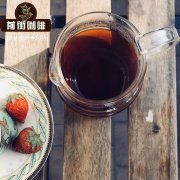Yunnan Coffee Iron pickup Coffee Bean Flavor Taste Yunnan small Coffee good?

Professional coffee knowledge exchange more coffee bean information please follow the coffee workshop (Wechat official account cafe_style)
Yunnan small-grain coffee, Rubiaceae, coffee genus, the planting area is mainly distributed in Lincang, Baoshan, Simao, Xishuangbanna, Dehong and other states. Small grains of coffee are native to Ethiopia or Arabian Peninsula.
Main producing area
Small-grain coffee is suitable for growing in the mountain area of 800 meters above sea level. If the altitude is too high, it will taste sour, and if it is too low, it will taste bitter. Small grains of coffee are mostly planted in dry and hot valleys about 1100 meters above sea level, so they are moderately sour, rich and mellow. There is a unique environment suitable for the growth of small seed coffee in many areas of Yunnan, and the quality of small seed coffee is excellent.
The planting areas are mainly distributed in Lincang, Baoshan, Simao, Xishuangbanna, Dehong and other states. The average temperature of Baoshan is 21.5℃, and the highest is 40.4℃, which is basically frost-free all the year round. It is recognized as the best producing area of small-grain coffee. The small-grain coffee cultivated here is famous at home and abroad for its strong but not bitter, fragrant but not strong, well-proportioned small noodles, mellow and fruity. International Coffee Organization tasting experts evaluate Yunnan coffee as the highest quality coffee in the world, such as Colombian wet-processed small-grain coffee.
Variety
Tibika coffee bean (Typica): the oldest native variety in Ethiopia and southeastern Sudan. All Arabica are derived from Tibika. The flavor is elegant, but the physique is weak, the disease resistance is poor, the fruit yield is less. Excellent manor beans such as the Blue Mountains of Jamaica, Manning of Sumatra and Kona of Hawaii all belong to Tibika. Tiebika top leaf is red copper, called red top coffee, Tibika belongs to Arabica.
Catimor: in 1959, the Portuguese mixed Brazilian Kaddura and Timo to develop a disease-resistant Katim / Katimo, which is now an important variety of commercial beans.
Growing period
Yunnan small grain coffee 3mura-4-year-old fruit tree.
Coffee is a short-day plant. Coffee has the characteristics of multiple flowering and concentrated florescence. The flowering period of small seed coffee in Yunnan is 2mi-July, and the flowering period is 3m-May. The flowering of coffee is greatly affected by climate, especially rainfall and temperature. The life span of coffee flowers is short, only 2 murmurs for 3 days. Small seed coffee usually opens at 3: 00 am and 5: 00 am, and blooms at 5: 00 am.
The development time of coffee fruit is longer. It takes 10 months for the fruit of small seed coffee to ripen in 10-December of the year. Rainfall has a great influence on fruit development, and climatic conditions directly affect fruit development.
The new leaves at the tips of the branches and leaves above are copper, which is Tiebika growing coffee trees. Tibika is an old variety of Arabica species. The well-known Kona of Hawaii and the Blue Mountains of Jamaica are actually Tibica coffee beans. In the vast expanse of Katim, it is easy to recognize. After careful observation, you will find that each species has its own appearance, Katim's leaves are hanging down, the tree shape seems to be wearing a cloak. Tiebika, on the other hand, has upward branches and new leaves on the top of the tree.
Along the way, most of the varieties planted in Yunnan are Katim, which is a hybrid of Kaddura and Robusta, a branch of the bourbon line in the Arabica species. The reason for planting this variety is that Katim has the Robusta gene, so it is better than a single old variety in disease resistance, and the yield is good. Compared with the delicate old variety, the disease resistance is poor and the yield is low. Farmers naturally prefer to plant Katim. So now there has been a Katim wind in Yunnan.
(Tibica coffee beans)
Katim beans are round and thick, Tibika is thin and long, and Katim's central line is messy. Under the same conditions, Tiebika's quality is better than Katim's, and the price is also on the high side.
Baking degree: medium and deep baking
Dry aroma: roasted peanuts (roasted peanut), hazelnuts (hazelnut), melons (melon), chocolate (chocolate-like)
Wet fragrance: oolong tea (rose-tea), caramel (caramel), honey (honey), chocolate (black- chocolate), almond skin (almond skins), silky taste (silky mouthfeel), bright feeling (brightness)
Taste: sweet, bitter and shallow, mellow and balanced, rich in layers, with obvious taste of dark chocolate, honey and sucrose, with a sticky feeling. After complete cooling, the strong aroma of oolong tea has the sticky feeling of caramel syrup when touched with fingers.
Recommended cooking method: hand flushing
Degree of grinding: 4 (Fuji R440)
Water temperature: 88 °C
Other suggestions for trickling extraction:
Normal pressure, recommended grinding degree of 3.5-4 / water temperature 90 °C
Philharmonic pressure, recommended 2.5 grinding degree, water temperature 88 °C
Siphon kettle: 3.5 grindability
Related recommendation: Yunnan small coffee beans how to brew Yunnan small coffee brand recommendation
Important Notice :
前街咖啡 FrontStreet Coffee has moved to new addredd:
FrontStreet Coffee Address: 315,Donghua East Road,GuangZhou
Tel:020 38364473
- Prev

Yunnan Coffee Huaguoshan producing area Fine Coffee Bean introduction to Yunnan Coffee what are the fine beans
Professional coffee knowledge exchange more coffee bean information please follow the coffee workshop (Wechat official account cafe_style) country: China altitude: 1200 meters production area: Yunnan roasting degree: moderate roasting treatment: washing the main producing area of small grain coffee is suitable for growing in the mountains at an altitude of 8001800 meters, if the altitude is too high, the taste is sour, too low, the taste is bitter. Most small grains of coffee are planted in the sea.
- Next

Taste of Lahu Yami full Red Fruit Sun Flavor in Lancang Coffee producing area of Yunnan Coffee Fine Bean
Professional coffee knowledge exchange more coffee bean information please follow the coffee workshop (Wechat official account cafe_style) Yunnan coffee Lancang producing area Lahu Yami full red fruit sun country: China producing area: Yunnan Lancang bean seed: Katim altitude: 1350 meters treatment method: sun this batch of coffee from Lancang producing area, produced by Yunnan Aizhe coffee team, planted at 1 altitude
Related
- Detailed explanation of Jadeite planting Land in Panamanian Jadeite Manor introduction to the grading system of Jadeite competitive bidding, Red bid, Green bid and Rose Summer
- Story of Coffee planting in Brenka region of Costa Rica Stonehenge Manor anaerobic heavy honey treatment of flavor mouth
- What's on the barrel of Blue Mountain Coffee beans?
- Can American coffee also pull flowers? How to use hot American style to pull out a good-looking pattern?
- Can you make a cold extract with coffee beans? What is the right proportion for cold-extracted coffee formula?
- Indonesian PWN Gold Mandrine Coffee Origin Features Flavor How to Chong? Mandolin coffee is American.
- A brief introduction to the flavor characteristics of Brazilian yellow bourbon coffee beans
- What is the effect of different water quality on the flavor of cold-extracted coffee? What kind of water is best for brewing coffee?
- Why do you think of Rose Summer whenever you mention Panamanian coffee?
- Introduction to the characteristics of authentic blue mountain coffee bean producing areas? What is the CIB Coffee Authority in Jamaica?

